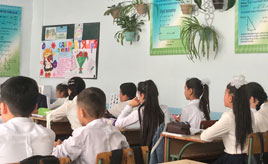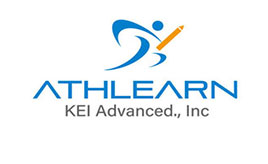We support the further growth of university students from acceptance until graduation. and the enhancement of their educational capabilities.
- Pre-Matriculation Educational Programs
- Academic Ability Comprehension Test
-
FD
Faculty Development -
SD
Staff Development - Generic Skills Assessment and Development
- Remedial Education
- Freshperson Educational Courses
- University Life: Introductory Course on Reading and Writing for Learning
- Career Development Education Courses
- Global Talent Training
-
Support for process of educational innovation
(from RPDCA perspective) - Solutions and Case Study
- Efforts to Achieve University Education Based on Three Policies
Pre-Matriculation Educational Programs
Developing the basic academic abilities needed in university and providing a smooth transition to university education
Using the months between university acceptance in the fall and enrollment, we provide learning opportunities to develop basic academic abilities and motivate students to learn.
| Textbook Learning | e-Learning | |||
|---|---|---|---|---|
| Program | Subject Program | Japanese reading and writing Training Course | Warming Up Course | e-Learning Course |
| Course Characteristics | Two levels of teaching materials are available to review the content of high school courses. | Teaching materials are designed to help students develop the reading and writing skills necessary to progress in their university studies. | Students will read long passage on topics relevant to their studies in their respective faculties after enrollment, research literature and news, and develop their ability to organize their thoughts. | Utilizing AI(artificial intelligence) technology, we provide topics based on each learner's level of understanding from a wide range of content. |
| Benefits | To support continuous learning by setting total of three assignment deadlines during the course | To support continuous learning by setting total of three assignment deadlines during the course | To support continuous learning by setting total of three assignment deadlines during the course | Intensive learning is available according to students’schedules |
| How to deliver the text book | Delivery (sent 3 times) | Delivery (sent 1 time) | Delivery (sent 3 times) | Online |
| How to submit the answer | Photo taken of answer sheet with smartphone or other devices and upload from designated website | Online | ||
| Scoring/Correction Method | [Intermediate Level] Automatic scoring of answer sheet |
Corrected by expert staff | Corrected by expert staff | Automatic scoring online |
| [Basic Level] Scored by expert staff |
||||
| Course Period | Approx. 3-month period before entering university matriculation | |||
| Difficulty | Easy to intermediate | Easy to intermediate | Easy to intermediate | Intermediate to difficult |
| Provided Subjects | [Intermediate Level] English, Mathematics (science/humanities), Physics, Chemistry, Biology |
University life, Introduction to reading and writing for learning |
Courses by faculty (Japanese/English literature) Humanities, international studies, social sciences, natural sciences and information systems, humanities and sociology | English, Mathematics, Physics, Chemistry, Biology |
| [Basic Level] English, Mathematics, Physics, Chemistry, Biology |
||||
| Post-implementation Report | Implementation Results Report for faculty and staff | |||
Academic Ability Comprehension Test (Placement Test)
Objective measurement of basic academic skills up to high school
As more and more high school students with various academic levels enter universities in recent years, there is a growing need for tests to provide an objective measure of basic academic skills in junior and senior high schools. Our academic ability tests are quickly scored and reported, and we can help you manage the test during your busy school year.
Characteristics of Academic Ability Comprehension Test
- Wide range of subjects and levels available
- Compatible with a wide range of university deviation scores
- Detailed results reports, including individual grade sheet and list of correct answer percentages by question
Service Overview
| Subject Line-up | English (2 levels) / mathematics (3 levels each for science and humanities) / Japanese (2 levels) / physics / chemistry / biology / economics / learning and attitude survey |
|---|---|
| Testing Time | 60 minutes per subject / computer-scored answer sheet |
| Applicable Examinees | Generally those with a deviation score of 35-50 (Kawaijuku practice exam) Faculty/Department university students and prospective students |
| Exam Scope | Content from 1st to 3rd year of high school |
| Return of Results |
Flash report (score list) delivery: approx. three business days from start of scoring process Delivery of Final Result Report: approx. one month *For earlier delivery than above, an express grading fee will be charged separately. |
| Reports for Educators and Staff | Score distribution chart, average scores for each part/score percentages for each question, list of percentages of correct answers for each sub-question, list of grades for each individual |
| Use Example |
|
FD (Faculty Development) (Seminars/Workshops)
Wide range of services from seminars to training sessions in collaboration with the Kawaijuku Education Research and Development Department
We work with Kawaijuku's Education Research and Development Department, which is engaged in highly original research and development, while incorporating the knowledge of universities and research institutes, to provide custom support to each university.
Characteristics of KEI Advanced’s FD
- Custom-designed seminars and workshops in collaboration with Kawaijuku's think tank, the Education Research and Development Department
- Extensive contracted faculties from the Kawaijuku Group, etc.
- Workshops are available to design for everything from syllabus design to teaching methods
Service Overview
| How to deliver | Face-to-face/live online stream/seminars/workshops |
|---|---|
| Target Audience | Mainly educators (seminars are for educators and staff) |
| Contents of Courses/Seminars | Customized according to need |
| Start Date | Customized according to need |
| Faculty | Our contracted Faculty, or Kawaijuku Faculty/staff |
| Case study |
|
Examples of Course Areas
| Area | Theme (ex.) | Target | Format | ||
|---|---|---|---|---|---|
| Lecture | Workshop | ||||
| Education and Learning | Japanese language skill training | Develop a syllabus | Faculty | 〇 | 〇 |
| Teaching method | Faculty | 〇 | 〇 | ||
| Freshperson education reform | Administrators and faculties | 〇 | 〇 | ||
| Active learning teaching method | Faculty | 〇 | 〇 | ||
| Visualize of learning outcome | Administrators and faculties | 〇 | 〇 | ||
| Develop a rubric | Faculty | 〇 | 〇 | ||
| Review three policies relationships | Faculty | 〇 | 〇 | ||
| Career Education | Career policy design | Faculty and staff (mid-level to administrative) | 〇 | - | |
| Instructor skill development | Faculty and staff (mid-level to administrative) | 〇 | 〇 | ||
| Entrance Exam Reform | Achievement tests | Educators and staff | 〇 | 〇 | |
| Reform of high school and university connection, and university entrant selection | Educators and staff | 〇 | - | ||
| Global talent Education | Global trends | Educators and staff | 〇 | - | |
| Intercultural communication | Educators and staff | 〇 | 〇 | ||
| Overseas labor laws, contracts, and risk management | Staff | 〇 | - | ||
Generally themes for each area can be customized. For more inforamtion in areas other than those listed above, please contact us.
SD (Staff Development) (Seminars/Workshops)
Utilizing the wisdom of the Kawaijuku Group to support the professional development of staff
Utilizing the programs of Will Seed Co.,Ltd and our partners in the development and delivery of corporate human resource development and education programs, we can provide a wide range of services from business communications to management training and cross-cultural programs for international students.
Characteristics of KEI Advanced’s SD
- Designing courses and seminars on tailor basis in cooperation with Will Seed Co., Ltd.
- Usable in wide range of areas (from new staff to administrators)
- Overseas language learning dispatching and local internships also available
Service Overview
| How to deliver | Face-to-face/live online stream/seminars/workshops |
|---|---|
| Target Audience | Staff |
| Contents of Courses/Seminars | Customized according to need |
| Start Date | Customized according to need |
| Faculty/Trainer | Our contracted instructors, or Kawaijuku Group instructors/staff |
| Example of Service Utilization |
|
Examples of Training Areas
- Business communication training (for young staff)
- Team leader training (for mid-level staff)
- Business simulation training (for all staff levels)
- Theoretical thinking capability training (for administrators)
- Problem resolution enhancement training (for administrators)
- Basic administration training (for administrators)
You can consult with us about the content of trainings based on the above examples, depending on the needs of your university.
Generally themes for each area can be customized. For more inforamtion in areas other than those listed above, please contact us.
Generic Skills Assessment and Development
Simultaneously achieve objective assessment and generic skills development
PROG is the program designed to develop the general-purpose abilities, attitudes, and orientation - generic skills - that are required in society as university graduates, regardless of major or specialty. In addition to traditional self-assessments, PROG aims to provide a composite assessment of generic skills by establishing objective evaluation indicators.
Characteristics of Generic Skills Assessment and Development
- Simultaneously achieve objective assessment and generic skills development
- PROG test assesses practical capabilities in terms of both literacy and competency
- Experiental learning at universities starting with PROG
Service Overview
| Program |
|
|---|---|
| Implementation Period and Schedule |
|
| Provided Services |
|
| Feedback of PROG Test Examinee Result | For students ⇒ Individual report + PROG Enhancement Book For educators and staff ⇒ Overall totals + Exam results list |
| Areas Assessed by PROG Test |
|
| Examples of PROG Utilization |
|
*For more details about PROG, please see the following website.
https://www.prog-test.jp/
Available PROG Services
- Generic Skills Assessment
- "PROG Test" (included individual report, PROG enhancement book, explanatory sessions for students and educators <extra fee>)
- Generic Skills Training Course
-
- “Face-to-face course”
- Various Utilizations and Services of PROG
-
- Measuring educational outcomes based on DP and CP
- Measuring the effectiveness of entrance examinations based on AP
- Creating self-analysis materials of each student
- Utilizing as IR data, etc.
Generic Skills Training Courses (Live Course)
Development support for generic skills
The primary purpose of this program is to provide students with a foundation for more meaningful and enriching experiences in their specialized subjects and in their experiences they will have not only during their time at university but also after they become workers.
Characteristics of KEI Advanced Generic Skills Training Courses
- Support university skills development in various forms
- Course design can be customized
- PROG test can assess an effectiveness of course
Service Overview
| How to deliver | Live courses with active learning style (service to help universities develop the generic skills of students) |
|---|---|
| Target | All students in higher educational institutions |
| Location | On campus |
| Opening | Full year, 1 semester, short-term intensive course, etc. |
| Instructor | Our contracted faculties, or Kawaijuku Group faculties, etc. |
| Use Examples in Combination with Other Services |
|
Remedial Education (Supplementary Lectures)
Remedial lectures for students who have not completed courses up to high school or with insufficient academic ability
Due to the diversification of entrance examinations, it is not uncommon for new students to enter a university's specialized program without completing the required courses or with insufficient academic skills. In such cases, we offer remedial lectures by our contracted instructors before and after enrollment.
Characteristics of Remedial Courses
- Preventing early dropouts by providing program for those with incomplete studies and insufficient academic ability
- No burden for operation of course with use of our contracted instructors
- Customizable according to needs, such as by combining it with the “Learning Support Classroom” where questions can be asked about topics studies up to high school
Service Overview
| Service Provision Format |
|
|---|---|
| Target Audience |
|
| Start Date | Around matriculation or year-round |
| Instructor | Our contracted instructors, or Kawaijuku instructors |
| Use Examples in Combination with Other Services |
|
Example of Courses Offered
- Mathematics
- Physics
- Chemistry
- Biology
- English
- Report writing
- SPI coaching
We offer a wide range of subjects from basic junior high school and high school level to specialized university subjects, all of which can be customized to meet your needs.
You can discuss your teaching area and level with us in advance.
Remedial Education (Operating Learning Support Classroom)
faculties are always available to help students smoothly learn in universities
Individualized instruction reduces the aversion to learning in universities of students and prevents an increase in the number of students who leave school due to poor academic performance. Instructors are selected from the Kawaijuku Group's network and are dispatched to instruct students.
Characteristics of KEI Advanced’s Learning Support Classroom
- Establish environment where Faculties can freely conduct learning consultation and ask questions
- The same faculties are stationed in schools to make it easier for students to ask questions
- Collaborate with universities and report on status of support for students
Service Overview
| How to deliver | We will rent a space at your university and dispatch a resident instructor |
|---|---|
| Target Audience | 1st to 4th year university students |
| Start Date | Year-round |
| Instructor | Our contracted faculties |
| Use Examples in Combination with Other Services |
|
Example of Contents of teaching or supporting
- Science and mathematics subject guidance
- Liberal arts subject guidance
- SPI preparation
- Report writing
- Collaborative guidance with faculties
- Japanese language skills support for exchange students
- Portfolio creation support
If necessary, we will meet and develop personal learning plans.
We check achievement levels and set future goals through the PDCA (Plan-Do-Check-Act) cycle and provide guidance leading to the motivation to learn.
Freshperson Educational Courses
Supporting a smooth learning transition from high school
The two main goals of freshperson education are to create a base for the development of general-purpose competence and to promote a shift to an active, autonomous and independent learning attitude. We help university students improve their basic skills by utilizing the experience and achievements of Kawaijuku that we have cultivated through exam education.
Characteristics of Freshperson Educational Courses
- Over 10 years of experience in providing freshperson educational courses
- Extensive contracted faculties from the Kawaijuku Group, etc.
- Can design seamless connections between high schools and universities by combining with remedial courses and pre-matriculation education.
Service Overview
| How to deliver | Face-to-face lecture |
|---|---|
| Target Audience | 1st year university students |
| Location | Universities |
| Start Date | After entrance, full year or half year |
| Faculty | Our contracted faculties, or Kawaijuku faculties |
| Use Examples in Combination with Other Services |
|
Organizing issues in freshperson education
It is necessary to re-systematize freshperson education in order to keep up with changes in society and students.
-
- Background
-
Diversification of enrollment through universalization of universities
-
Shift away from written word due to societal changes
Decrease in communication abilities -
No faculty specialized in freshperson education
-
- Issues
-
- Gap between passive learning in high school and experimential learning in universities
- Unfamiliarity with responding to questions have “no correct answer”
-
- Do not know how to gather or select information
- Do not know how to write reports
- Have no experience making presentations
- Should be prepared before entering university
- Do not understand the content of various subjects
-
- Get used to communicate in short messages among peers using email, social media, etc.
- Unable to choose words and formality according to circumstances
-
- In many cases, faculties who are not specialized in freshperson education are put in charge (they have to teach content outside of their area of expertise)
- When more than one faculty are in charge of courses, there may be discrepancies in content between them
-
- Way to solve Issues
-
- Generic Skills Development
-
- Develop proactive attitude to solve problems and problem-solving skills
-
- Academic Skills Development
-
- Develop reading and reporting skills necessary for studying at universities Development of basic academic abilities
- Consolidate basics of each subject as foundation for specialized learning
-
- Japanese Language skills Development
-
- Develop Japanese language skills necessary for smooth communication with people in various positions
-
- Freshperson Education Implementation Support
-
- FD lectures, etc. to convey know-how of implementing freshperson education
- Support for curriculum design in freshperson education
Our Strengths
- Proven records for freshperson education
- Records of running freshperson courses for many years
- Wide range of capabilities
- We can develop teaching materials and support the implementation and operation of courses
- Wide variety of educational information
- Utilization of Kawaijuku Group's education-related information
University Life: Introductory Course on Reading and Writing for Learning
Students will acquire the ability to think thoroughly and develop their ability to express themselves autonomously.
This is an introductory course that cultivates the reading and writing skills that will form the basis of various studies in university life. The course utilizes familiar newspaper articles to train students to read and write on familiar themes as a basis for learning at university, and through training in reading and writing, students will acquire the ability to think thoroughly and grow their ability to express themselves autonomously. This is a learning activity that will ultimately lead to the creation of reports essential for learning. The system allows students to review themselves objectively and see their growth process by self-evaluating themselves using the learning evaluation criteria (rubric) and recording what they think, notice and understand after submitting assignments.
Self-metacognition by Rubric
Submitted work will be evaluated for achievement using a rubric. By leaving three paths of progress, you will be able to visualize your growth. In addition, students will be able to check how their reading and writing skills have changed by leaving their impressions in writing after assignments.
Career Development Education Courses
Wide range of support from career development to job hunting support
We provide courses that develop the knowledge, skills, abilities and attitudes necessary to engage in certain or specific occupations on a custom basis.
We propose course arrangements that make effective use of students' free time.
Characteristics of KEI Advanced’s Career Development Education Courses
- Design custom courses by utilizing Kawaijuku Group's rich assets (instructors and Group companies)
- Customize a range of corporate talent development programs from our group company, Will Seed, for universities
- Possible to design seamless connections between universities and society by combining with generic skills measurement and development
Service Overview
| How to deliver | Face-to-face lectures or seminars/live online streaming |
|---|---|
| Target Audience | 1st to 4th year university students |
| Location | Universities (on-campus lectures, career center-sponsored lectures, etc.) |
| Opening and schedule | Full year, 1 semester, short-term Effective use of students' free time in morning and evening |
| Faculty or Trainer | Our contracted faculties, or Kawaijuku Group faculties, etc. |
| Case Study in Combination with Other Services |
|
Examples of Course Areas
- Career development support
- SPI / general knowledge preparation lectures
- Communication
- Business etiquette
- To become someone chosen when job hunting
- Job search ideas for athletes
- Internship pre- and post-training lectures
- Examination preparation lectures for educators, school staff and public servants
- Entry sheet writing lectures
- Practice interview lectures
You can consult with us about the offered subjects based on the above examples, depending on the needs of your university.
SPI / General Knowledge Preparation Lectures Example of Timetable/Program
Examples of Timetable Allocation for Morning Activity Courses and Evening Activity Courses
| Lecture schedule | Mon | Tues | Wed | Thurs | Fri |
|---|---|---|---|---|---|
| 1 | (Morning activity) SPI non-verbal processing |
(Morning activity) SPI non-verbal processing |
(Morning activity) Current events and general knowledge |
||
| 2 | |||||
| 3 | |||||
| 4 | |||||
| 5 | |||||
| 6 | (Evening) Report writing lecture |
(Evening) Writing comprehension skill lecture |
(Evening) Relearn English from the basics |
(Evening) Relearn mathematics from the basics |
(Evening) From TOEIC and other preparatory courses to graduate school entrance exams |
| 7 |
SPI / General Knowledge Preparation Lectures Program Example
| Lecture | Language Processing | No-language Processing | Current Events / General Knowledge |
|---|---|---|---|
| 1 | Proverbs/idioms | Deduction | Political terms |
| 2 | Kanji character readings | Monetary questions (discounts, profit/loss calculation) | Acronyms from current events |
| 3 | Word usage | Sets | Katakana words from current events |
| 4 | Relationship between words | Graph area | Political and economic current events |
| 5 | Fill in the blanks | Speed | Social current events |
| 6 | Origin of idioms | How to read tables | International current events |
| 7 | Basic word order | Number of possible outcomes (permutations, combinations) | English (synonyms) |
| 8 | Applying word order | Probability | English (fill in the blanks) |
| 9 | Synonyms/Antonyms | Proportions | English (Japanese to English translation) |
| 10 | Long text reading comprehension | Summary | English (long text reading comprehension) |
Global Talent Training
Global Education Promotion Program (language courses, index analyses)
Providing analysis of current state of global education and best solutions for language courses to improve university education and implement teaching reform
We analyze the trend of current exam results and design a custom program for universities to achieve global talent development by utilizing the programs of Nichibei Eigo Gakuin and its partners, which are known for qualification acquisition and academic skill improvement.
Characteristics of Global Talent Training
- Global Talent development programs available in Japan
- Suitable for wide range of people (from university students to educators and staff)
- Also, possible to analyze examination data trends for external English language exams
Service Overview
| How to deliver |
|
|---|---|
| Target Audience | University students, faculty and staff |
| Training Contents | Customized according to need |
| Opening | Schedule according to need |
| Trainers | Our contracted trainers |
| Case Study in Combination with Other Services |
|
|
Example of Provided Programs (held at universities)
- TOEIC/TOEFL Preparation Lecture
- For employment and study abroad exams
- Academic Skills Improvement Course
- To enhance grammar and vocabulary skills
- Presentation Skills Improvement Course
- To improve ability to convey your own thoughts
- Overseas Living English Conversation Preparatory Course
- To prepare for studying abroad either short- or long-term
*Possible to outsource (group and private lessons available)
*Customized period to three months
*Available in Tokyo metropolitan and Kansai areas
Support for process of educational innovation(from RPDCA perspective)
End to end support through RPDCA cycle
Solutions and Case Study
Educational reform solutions for the qualitative transformation of university education and the development of human resources in response to globalization
The social environment is changing with the rapid progress of globalization, the falling birthrate and aging of the population, and the decline in the working age population. Under these circumstances, university education is required to create an educational environment that responds to globalization, to strengthen the educational functions that train students and send them out into society, and to create an educational and research environment that creates innovations that drive society forward.
We support the educational reform process with our various solutions for universities and other higher education institutions.
Introduction of Solutions
| Issues | Solutions | Provided Services | Solution Outline | |
|---|---|---|---|---|
| Qualitative change in education | Visualize learning outcomes |
|
|
We will use the PROG and other tests to compare student literacy and competency across departments and with other populations, as well as evidence-based analysis in combination with other teaching data, and support the consolidation and visualization of various teaching and learning data and the development of e-learning content through the use of e-portfolio in collaboration with our partners. We will also support awareness activities such as the need for evidence-based discussions within universities through faculty development. |
| Responding to diversed student |
|
|
In response to the diversification of entrance examinations and the diversity of students entering universities, we support the design of freshperson education systems that help new students become self-reliant and independent, the introduction of active learning, and the development of Japanese language skills necessary for studying at universities. For freshperson education, we can support everything from one-time lectures to system design and the operation of subsequent courses. Through faculty development, we also support awareness activities for educators and staff in order to promote reform at the same level within universities. |
|
| Talent development required by society |
|
|
In a rapidly changing social environment, students continue to learn throughout their lives. To meet the demand for human resources that can think and act proactively and create innovation, we have introduced the concept of versatile skills and reflected them in our curriculum. We also support the introduction of PDCA (Plan-Do-Check-Act) measures and job-hunting techniques, as well as business and communication skills before and after internships. | |
| Education Reform |
|
|
We do not think of solutions to the problems in various university reform promotion projects throughout the country, but rather we support the way to find solutions as an assistant. We will support educators and staff in reducing fixed costs and utilizing outside expertise by outsourcing some of the project execution to outside organizations. Through faculty development, we also support awareness activities for educators and staff in order to promote reform at the same level within universities. |
|
| Globalization | Global talent Development |
|
|
By defining skills and competencies that can be used in the global marketplace and focusing on the less visible and less highlighted areas, we support the construction of programs that focus on general-purpose skills, mindset and cross-cultural understanding necessary for any job. We also support the globalization of educators and staff through FD/SD. |
Case Study
| Customers | Issues | Solutions | Provided Services | Solution Outline | |
|---|---|---|---|---|---|
| Qualitative change in education | Private universities (Chubu region) |
Quality assurance in education Responding to diversed student body |
design a course and operation of freshperson education in multiple faculties |
|
For more than ten years, we, as the Kawaijuku Group, have been involved in discussions about the definition of freshperson education. We have been designing courses since then to incorporate active learning into academic skills and Japanese language courses, as well as managing them. We have also contributed to the university's exit strategy. |
| Private universities (Hokuriku region) |
Talent development required by society | Introduction of Generic Skill training courses and support for visualization learning outcomes through freshperson education reform in all faculties |
|
As part of freshperson education reform in 2015, a generic skills development course with 15 session was first introduced in the second semester of the basic seminar. As part of the introduction, the awareness of educators was first changed through FD using an active learning-based training method, which was implemented by a centralized system within the university. After that, plans to hold PROG twice a year to measure effectiveness of course and to support implementation of follow-up FD. | |
| National universities (Kyushu region) |
Responding to diversed student body | Introduction of university-wide active learning in freshperson education |
|
Since 2015, the Center for Higher Education has led the introduction of active learning across the university, starting with FD as a kick-off for active learning and examples of its introduction, as well as hands-on experience in workshops. As a follow-up, plans to support introduction of active learning by conducting FD in form of workshops to create teaching materials and rubric for next level. | |
| Universities, technical colleges, and the Ministry of Economy, Trade and Industry (Chubu region) |
Talent development required by society | Support for talent development through basic skills for adults, acquisition of training methods and implementation of training sessions to improve skills |
|
Targets students of technical colleges, university students of science, and young technical employees in companies, all who are future leaders of manufacturing industry in Chubu region, to improve their basic skills as adults and mindset of intellectual property by adding intellectual property skills to basic skills, among those required by companies to play an active role in society, and through these courses, students will acquire minimum skills and mindset required for any kind of job in society and develop human resources who can play an active role in various specialized fields, such as research and development departments of companies. In addition, workshops were held for technical college educators and staff to acquire and improve their skills in education for basic skills for working adults and methods for fostering intellectual property education. |
|
| Private universities (Tokyo metropolitan area) |
Education Reform (National AP Project lead by MOE Theme Ⅱ: Visualize of Learning Results) |
Survey of actual situation of students by department and visualize the data from survey |
|
With the adoption of the AP project, PROG was introduced for all 1st grade students by providing improvements and visualization learning outcomes through the construction of an assessment model for a liberal arts education, and supporting the creation of a unique index of general-purpose abilities, attitudes and aspirations among the abilities developed that education. | |
| Globalization | National universities (Tokyo metropolitan area) |
Global talent development of enrollees (shift to development of practical English communication skills) |
Introduction of writing ability program, in addition to speaking program by using Skype and the internet |
|
For students entering in the academic year 2016, we have a program shifting from reviewing English for entrance examinations that focuses on the usual text-based listening and reading input skills, to a program for communicating with overseas universities in which students introduce themselves and their motivation for applying writing online, and then practicing the corrected statements in practical conversations using Skype with non-native speakers who they are likely to have many opportunities to speak with in English in the future. Planning to combine speech contest utilizing what was learned with university with the Global Mindset Course. |
Efforts to Achieve University Education Based on Three Policies
Support for education management establishment and accreditation
1.Systematic curriculum formation accommodating diversed students
- Review and enrichment of freshperson education, curriculum development to help students learn actively
- Develop systematic curriculum, teaching materials and learning support system that enables diverse students to review learning and process from entrance to graduation utilizing numbering, etc.
- Curriculum development emphasizing social connections and other relationships
- Visualize educational content and learning outcomes, and release of information to society, etc.
KEI Advanced’s Support Services
- Freshperson education management design
- Provide visualized tools (PROG)
2.Shift from classes that focuses on knowledge transfer and injection to active learning
- Efforts to make credit system more effective by increasing student learning time
- Enhancement of educational methods such as active learning (AL) and flipped classes
- Fundamental enhancement of quality and quantity of academic content through expansion of reading assignments, etc.
- Sufficient acquisition of high-quality knowledge and skills that are foundation for learning and working with diversed people with experiential learning
- Enhancement of off-campus programs such as study abroad and internships
KEI Advanced’s Support Services
- Active learning introduction support (FD)
- Generic skills development support
3.Understanding and Evaluating Learning Effectiveness
- Development and practice of specific methods for understanding and evaluating learning results (assessments, study behavior surveys, rubrics, etc.)
- Development of system for recording and reviewing students' study history and supporting study design
- Rigorous evaluation and academic support through use of GPA system
- Follow-up surveys of students upon graduation and results feedback, etc.
KEI Advanced’s Support Services
- IR introduction support
- IR analysis support
- e-Portfolio
4.Development of system to support implementation of well-rounded university education
- Enhancement of FD/SD at each university and development of FD base location between universities
- Promotion of facultiy’s educational performance evaluations (class evaluations, teaching portfolios, etc.)
- Enhancement of TA assignment as an other education support staff
- Construction of portal site to collect class and FD materials, pre-FD for doctoral students(second semester)
- Improvement of environment for active learning, including learning commons and libraries
KEI Advanced’s Support Services
- Various FD
- Improvement of accreditation system
- We provide comprehensive support through the teaching management based on the three policies.













